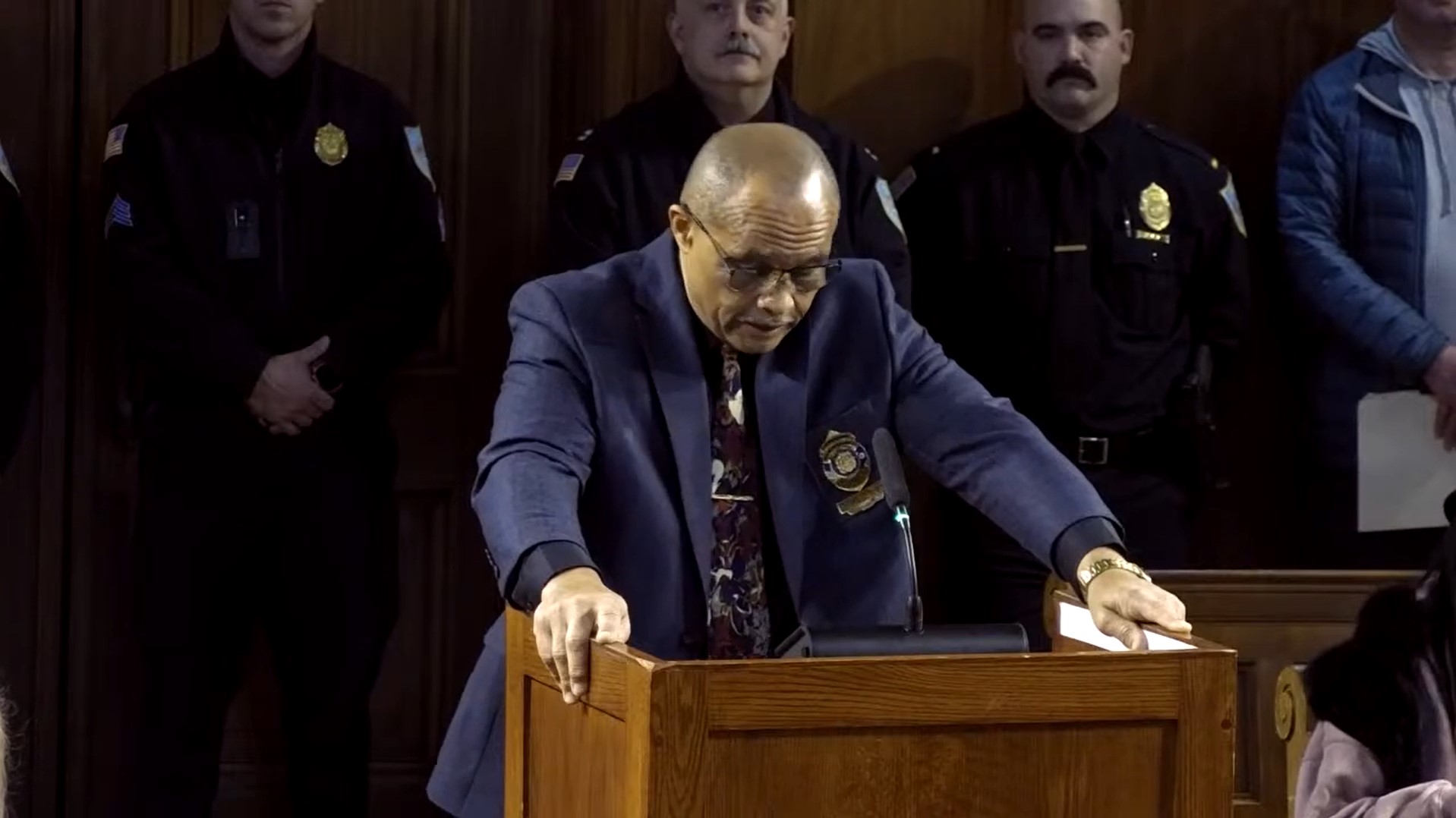Police Superintendent Lawrence Akers was joined by members of the Springfield Police Department during the Feb. 10 City Council meeting to ask for the council’s approval of a funding package that upgrades the department’s technology.
Photo credit: Focus Springfield
SPRINGFIELD — In an attempt to bring the Police Department’s technology into the 21st century, the City Council approved a funding package of $7.2 million to upgrade the department’s technology.
The approval means the Police Department enters a five-year contract with Axon to update its body worn cameras, tasers and other software products.
The $7.2 million will be spread over five years, according to the city.
Not only does the contract satisfy the technological needs of the department, it also allows the “SPD Professional Standards Unit to achieve and maintain SPD’s compliance with their DOJ [Department of Justice] Settlement Agreement requirements,” which were developed after a report released in 2020 found that the Springfield Police Department’s Narcotics Bureau, now named the Firearms Investigation Unit, engaged in a pattern or practice of excessive force.
The Police Department claims that the five-year deal with Axon is the most fiscally-responsible route to update the technology because it “will allow lower annual payments than a three-year contract,” and the city will save $2.6 million over the five years, according to the order.
When speaking to the council during its Feb. 10 meeting, Police Superintendent Lawrence Akers talked about how the department is still stuck in the 20th century “in many areas,” and mentioned the fact that its records management system has not been updated since the mid-1990s.
“What I’m looking to do is to bring our department into the 21st century,” Akers said. “I just want to tie up all of the loose ends that we have so we can function as a better department.”
Akers said that body worn cameras have been crucial to the department’s goal of reducing bad behavior amongst its officers, but the five-year contract the department currently has with the mobile technology company Getac is expiring, and the technology itself is not satisfying the needs of the department.
“It’s to the point we’re returning two cameras a week just to come in for repair,” Akers said. “Their software updates are not keeping up with our needs, and their customer service has a lot to be desired.”
About eight months ago, Akers put together a committee to help the department solve its body cameras issue, but the committee found that the antiquated technology problem extended beyond the cameras.
The department also realized through the committee’s studies that they have been working in silos for many years.
Akers stated that the Axon deal will help SPD streamline and track the required policies, procedures and compliance metrics, while also providing the department with all their technological needs.
“We’re bringing everything together in one package,” Akers said. “That way, we get rid of the silos; [and] one hand knows what the other one is doing, because if we continue in this route, it’s going to cost us millions more to continue at this rate, and we just can’t do that.”
Akers said the agreement with Axon means the department will have 550 body worn cameras and 350 tasers, a stark increase from the 511 cameras and 100 tasers SPD had about five years ago.
The new tasers will work at a maximum of 45 feet away compared to the current 25 feet, which Akers said is important because SPD can now eliminate the “drive stun,” a maneuver that yielded many public complaints in the past.
“We need to equip all of our officers with this hardware in order to make sure that everyone can do the things that they need to do on the street,” Akers said.
Although some members of the council felt “sticker shock’ when they saw the $7.2 million bill, the body ultimately voted in favor of the funding package 11-0 because of the department’s dire need for updated technology, and because the five-year deal made it so annual payments are more fiscally manageable.
“I want to commend the commissioner and the job he has done,” said Ward 4 City Councilor Malo Brown. “When you think about the actual amount and spread over the actual five years, it’s not that much money.”
Ward 6 City Councilor Victor Davila said he is on board with updating the technology because it could potentially decrease liability to the city.
“The $7.2 million, it is a little bit of a shocker when you first look at it,” Davila said. “But it makes sense.”
Akers said SPD can sign the new contract as early as March 24. Once that happens, the department can begin the transition of equipment and software along with the training process.
The council’s funding package vote included the approval of a bond authorization of $2.5 million to help pay for the body-worn cameras and tasers. Cathy Buono, the chief administrative and financial officer for the city, told the council that Springfield could have bonded for $3.1 million, but the city wants to keep its bonding to a minimum.
The city also approved $1.5 million in free cash to cover fiscal year 2025 expenses for the new technology.



